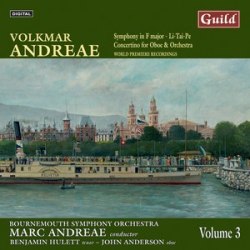| 
|
Volkmar ANDREAE (1879-1962)
Symphony in F major (1898-1900) [37:12]
Li-Tai-Pe, Eight Chinese Songs for tenor and orchestra, Op.37 (1931)
[22:03]
Concertino for oboe and orchestra, Op.42 (1941) [18:33]
Benjamin Hulett (tenor): John Anderson (oboe)
Bournemouth Symphony Orchestra/Marc Andreae
rec. June 2013, The Lighthouse, Poole, Dorset
Texts included
GUILD GMCD 7400 [78:35]
This is the third volume (vol. 1; vol. 2) in the Volkmar Andreae series from Guild and it presents three world premiere recording, all presided over by the composer’s grandson, conductor Marc Andreae. Charting a chronological course we start with the Symphony in F major, which was completed in 1900 when the composer was barely twenty-one. It’s couched in four movements, conventionally-styled, and lasts 37 minutes in this performance. Though the booklet notes ask us not to make much of Brahms’s influence, this is surely an impossible instruction to follow. It’s like asking a cat not to chase a mouse. This is a very Brahmsian work, in terms of thematic development and sonority, and many passages will alert one to the influence of the older composer on the student one. Andreae shows a firm control of his material and handles orchestration well – brass, lower strings and percussion in particular. If there is another influence it’s not Bruckner, whom Andreae was years later to champion as a conductor and whose splendid symphonic cycle I reviewed not so very long ago - and hugely admired, I should add. The other influence, at least in terms of the writing for winds, is Dvořák. The most interesting features of the work are the rather sombre march theme in the second movement and the auburn string tone in the finale, before the emergence of a triumphant chorale-like theme, and the symphony’s quiet resolution.
If the Symphony should be seen in the context of Andreae’s early development, Li-Tai-Pe, Eight Chinese Songs for tenor and orchestra, Op.37 is a product of his maturity. There’s considerable volatility here, both in terms of rhythmic vitality and also in the subtlety of the quietly reflective writing, deftly orchestrated, and illuminating the texts with real insight. The work suits the light tenor of Benjamin Hulett who negotiates the demands freshly and keenly. There are some moments of obvious chinoiserie in the wind writing but they are chosen to heighten the music, not to draw one’s ear for reasons of mere sonic titillation. The writing for strings is often refined and there are hints now and then of Mahler’s song cycles. All early performances of this work were given by the great Julius Patzak.
The final work is the Concertino for oboe and orchestra, Op.42, composed in 1941. This is a lovely, rather pastoral work that flows and muses, enshrining a more active, dynamic B section in the opening of its three movements. A perky Rondo is followed by a felicitous folkloric finale. The performance by John Anderson is extremely fine and as throughout the disc he is most sympathetically supported by Marc Andreae. Of the three works the Concertino is the most easy-going, the songs the most stringent and complex. But it’s the Concertino that most seduced me and I have to say it’s rather amazing that it’s never before been recorded. Incidentally no less a figure than Richard Strauss was later to dedicate his own Oboe Concerto to Andreae.
Uneven though this disc is, compositionally speaking (largely because of the Symphony), the third volume in this series brings with it very interesting and exciting features for the increasing number of Andreae admirers.
Jonathan Woolf
Previous review: Rob
Barnett
 |
 |
|
